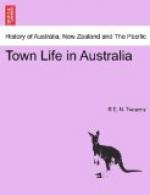Melbourne attracts to itself most of the able and clever men in literature and journalism There is a pleasant press club there called the ‘Yorick,’ which forms a sort of literary focus; and for one clever, writer whom you find in the other colonies put together, there are two in Melbourne. It is the only Australian city which can claim to have anything approaching to a literary centre. It is no wonder, then, that the Argus is the best daily paper published, out of England. There are people who assert that it is only second to the Times; but without going so far as this, there is ample room for surprise on the part of the stranger, and pride on that of the Australian, that so excellent a paper can be produced amidst so small a population, and under so great difficulties of distance from the centres of news and civilization. The Argus will compare favourably with the Manchester Guardian, Leeds Mercury, or any other of the best provincial journals. In many respects it will be found superior to them; but although the amount of reading matter it contains is often larger than in the Standard or Daily News, it cannot reasonably claim comparison with them. The leading articles are able, though often virulent; the news of the day well arranged and given in a concise, business-like manner; the telegrams—European, intercolonial, and provincial—are full, the expenditure in this department being very large. Literary articles are more numerous than in the London dailies, and are generally well executed. The theatrical critiques, though the best in Australia, are somewhat poor. The reports of parliamentary proceedings, public meetings, etc., are exceedingly full and very intelligently given, and their relative importance is well estimated. Throughout, the paper is admirably proportioned and well edited, the paragraphs being much more carefully written than in any London paper except the Times. There is rarely a slipshod sentence to be found in any part of the paper, which is the more remarkable as slipshod writing is a noticeable characteristic of almost every other colonial paper. The leading articles are for the most part supplied by contributors not on the permanent staff, two university professors being amongst the best known. They also write reviews and literary articles, though the doyen in that department is Mr. James Smith, to whom the Argus pays a retaining fee of L500 a year. Art criticism is also in Mr. Smith’s hands; and although all his work is essentially bookish and wanting in originality, he thoroughly understands his subjects, and his style and language are excellent.




